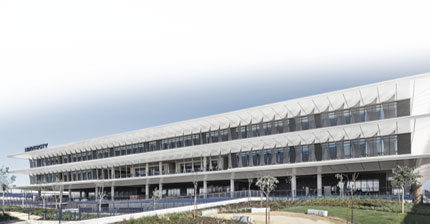PhD in Systems and Sustainable Engineering at Loyola University allows researchers to train with professors with extensive experience and international recognition. The Program aims to stimulate the generation and development of applied knowledge that can be transferred to society in its different expressions, materializing in the creation of rigorous scientific knowledge that favors technology transfer within an innovative environment. The program has two main lines of research: Optimization and Control of Distributed Systems (ODS) and Materials and Sustainability (M&S)
The PhD in Systems and Sustainable Engineering of Loyola University Andalusia aims to guide future researchers in learning innovative methods, processes, and analysis techniques with a practical multidisciplinary approach that can face, in a scientific way, the main scientific and social problems of the field in engineering.
This doctoral program aims at engineers and scientists with innovative vision and concern to transform society through the development of rigorous, applied science aligned with the current global challenges.
RENOWNED RESEARCH TEAMS
FACE-TO-FACE & VIRTUAL CLASSES, COMPATIBLE WITH OTHER ACTIVITIES
INTERNATIONAL MOBILITY & COLLABORATION AGREEMENTS
PERSONALISED ACADEMIC GUIDANCE AND SUPPORT FROM TUTORS
Through its doctoral programmes, Loyola University reaches specific agreements with universities and research centres of interest, based on the specific needs expressed by teachers, tutors and directors. According to the specific subjects that doctoral students are investigating, the academic committee guides students toward a research stay, grant or precise and personalised activity matched to the profile of people undertaking their dissertations in this programme.
If your past efforts are reflected in your marks, you’ll have the opportunity to obtain one of the 10 prizes we award, which can cover up to 100% of the programme cost.
Further, Loyola University has a wide range of scholarships and financial aid so that nobody who is fulfilling their academic requirements will have to stop studying for financial reasons. The scholarships and financial aid packages for studying at Loyola University are established with the university’s own funds.
Loyola University has signed agreements with financial institutions to facilitate students’ access to undergraduate, postgraduate, executive and doctoral studies.
Possibility of establishing a collaboration with the research groups at Loyola University from the time you embark upon your dissertation, as well as with companies and organisations with R&D departments. You will enjoy research stays, grants and precise and personalised activities based on the profile of the doctoral students working on their dissertations.

All doctoral programmes at Loyola University include research courses, seminars, conferences and workshops that contribute to developing their necessary academic skills.

You will have the chance to reap the benefits of the teaching and research experience of professionals with high-impact studies, R&D projects and management of PhD dissertations. Loyola Doctorates also works with an impressive list of collaborators with recognised academic prestige in each field.

At Loyola Doctorates you can present your dissertation with international mention, with joint tutoring from other institutions or universities, or you can do an industrial doctorate.

The Seville Campus is the only campus in the world that has been honoured with LEED Platinum environmental certification, thanks to its deep commitment to the comprehensive sustainability of the entire grounds. There is a free wi-fi connection on the entire campus, study rooms, a modern library, terraces for resting and relaxing, a cafeteria, landscaped areas for strolling, sports facilities.

Our Jesuit identity unifies us in a network of over 230 universities throughout the world with an unmistakable background and prestige, which endorses our social mission. Loyola University is a member of UNIJES and the International Association of Jesuit Universities (IAJU).

| Title | PhD in Systems and Sustainable Engineering |
| Field of Knowledge | ISCED Code 1: 522 Electricity and Energy. ISCED Code 2: 523 Electronics and automation |
| Center for the degree | Doctoral School (Seville Campus) |
| Center of impartation | Sevilla and Córdoba |
| Date of publication of the plan of studies in the BOE | February 27th 2023 |
| First year of implementation of the degree | 2023-2024 |
| Duration of the training program | 4 o |
| Modality of teaching | Virtual |
| Languages used in the degree program | English |
| Places offered per course implemented | 10 |
| Regulated profession | Not applicable |
| Permanence Regulations | |
| Academic year | 2023-24 |
|
Number of new admission places offered per academic year implemented |
10 |
|
Number of new doctoral candidates enrolled per academic year |
The functions of the Academic Committee with regard to doctoral students are as follows:
Member of Academic Committee:
Mettings:
| Curso 22-23 | Cirso 23-24 |
| 14.04.23 | 11.09.23 |
| 20.06.23 | 23.10.23 |
| 27.11.23 | |
| 18.12.23 |
Basic
CB11 - Systematic understanding of a field of study and mastery of research skills and methods related to that field.
CB12 - Ability to conceive, design or create, implement and adopt a substantial process of research or creation.
CB13 - Ability to contribute to the expansion of the frontiers of knowledge through original research.
CB14 - Ability to critically analyse, assess and synthesise new and complex ideas.
CB15 - Ability to communicate with the academic and scientific community and with society in general about their fields of knowledge in the modes and languages commonly used in their international scientific community.
CB16 - Ability to promote, in academic and professional contexts, scientific, technological, social, artistic or cultural progress within a knowledge-based society.
Personal skills and abilities
CA01 - Coping in situations in which there is little specific information.
CA02 - Finding the key questions to be answered in order to solve a complex problem.
CA03 - Designing, creating, developing and undertaking original and innovative projects in their field of knowledge.
CA04 - Working both in a team and autonomously in an international or multidisciplinary context.
CA05 - Integrating knowledge, dealing with complexity and formulating judgements with limited information.
CA06 - Critique and intellectual defence of solutions.
Other skills
CE01 - Acquiring a multicultural, multidisciplinary and ethical vision in the development of new knowledge in the field of engineering.
SC02 - Comparing the different methodologies and models that can be used to deal with complex situations in the field of engineering.
SC03 - Ability to manage their curriculum vitae effectively for academic and scientific accreditation at any level.
SC04 - Ability to look at reality from a global and supportive perspective. Thinking globally and acting locally.
CE05 - Developing an entrepreneurial spirit with a willingness to make use of intellectual property and create technology-based companies based on research and development.
CE06 - Acquiring the basic skills and personal abilities indicated above in the specific fields of knowledge of Automation and Control Engineering, Energy Engineering and Industrial Engineering in general.
The knowledge required for admission to the Doctoral Programme in Engineering at Loyola University conforms to one of the following 3 profiles:
Profile 1
A degree in Industrial Technologies Engineering, Electromechanics, Energy or Electronics, Robotics and Mechatronics and related engineering fields, and a postgraduate level in one of the areas of knowledge related to the aforementioned degree qualifications awarded by an official master's degree programme in the European Union with a research or mixed focus in which the candidate has completed the research itinerary and a Master's Thesis of 12 ECTS credits or more.
Profile 2
A degree in Industrial Technologies Engineering, Electromechanics, Energy or Electronics, Robotics and Mechatronics and related engineering fields, and a postgraduate level in one of the areas of knowledge related to the aforementioned degree qualifications awarded by an official master's degree programme in the European Union, with a professional or mixed focus in which the candidate has completed the professional itinerary. Those who fit this second admission profile will have the opportunity to access the Doctoral Programme by taking the appropriate further training courses proposed by the programme's Academic Committee.
Profile 3
A degree in engineering, physical sciences, chemistry, computer science or mathematics, awarded by an official master's degree programme in the European Union, regardless of its focus. Industrial Engineering or similar from previous Spanish university degrees, in which the course load is equal to or higher than 300 credits, and therefore offer the possibility of pursuing a doctorate. Engineering studies from International Universities in 5-year programmes, qualifying students in their country of origin to undertake doctoral studies. Those who fit this third admission profile will have the opportunity to access the Doctoral Programme by taking the appropriate further training courses proposed by the Academic Committee.
Language Requirements and Levels
In addition to the above, in order to be admitted to the programme, candidates must accredit a B2 level of English through the qualifications accepted by Loyola University. If they are unable to do so, they will take a level test (online) developed by Loyola School of Language, Culture and Communication during the admission process.
Further Training
|
Profiles |
Further training |
|
Profile 1 |
Not required |
|
Profile 2 |
12 ECTS |
|
Profile 3 |
16 ECTS |
The admission of candidates who apply to the programme with profile 2 and 3 will be conditional on the completion of a series of further training courses. These will be designated by the Academic Committee of the programme and may be:
The Academic Committee is responsible for the follow-up of PhD graduates from the Doctoral Programme in Engineering at Loyola Andalucía University. To carry out this task, both the Doctoral School and the Vice-Rectorate for Research of Loyola Andalucía University will provide the Academic Committee with the necessary material and human resources.
The follow-up of PhD graduates from the programme will be carried out by means of the following:
- Assessment of the level of satisfaction of the graduates after the reading of the Doctoral Thesis.
- Design of specific activities such as seminars, courses and conferences for Doctoral Programme alumni.
- Maintenance of regular contacts (at least once a year) by the Administration and Services Staff of the Vice-Rectorate for Research.
- Design and development of a specific interactive section (graduates will be able to add the relevant information, if they so wish) on the University's website (Vice-Rectorate for Research) offering, at least, the following contents:
o Specific activities for PhD graduates from the Doctoral Programme.
o Information of interest to all former doctoral students who, for whatever reason, have not been able to successfully complete their doctoral studies.
o Job offers channelled through the University's Job Bank.
o Information of interest from the University's Innovation Office: new emerging ideas, knowledge-based business projects, patent management, etc.
o Announcements of R&D&I projects.
o Information on the progress of R&D&I projects underway.
o Information on scholarships and jobs offered by Loyola Andalucía University for PhDs.
o Information of interest on University Chairs and Institutes.
o Information on mobility channelled through the International Relations Service of Loyola Andalucía University.
o Who's who with the contacts and jobs of any graduates who wish to publish this information.
o A section for graduates to share activities, news, etc. Of interest to the group.
The aims of the follow-up activities of the programme's graduates are:
The forecast of the percentage of doctoral students who obtain grants for postdoctoral contracts in the Doctoral Programme in Engineering at Loyola University Andalusia is as follows:
The forecast of the percentage of doctoral students who will get a job linked to the training received in the Doctoral Programme in Engineering at Loyola Andalucía University is as follows:
The statistical information on the employability of students on this Doctoral Programme will be compiled by the Doctoral School. For this purpose, the Vice-Rectorate for Research will provide the necessary material and human resources for this task. The results of the analysis of this information will contribute to the continuous improvement of the programme by means of:
When accessing information about programme graduates, current legislation on personal data protection will be taken into account. All graduates of the programme will have the right, with prior written notification, to modify their data, as well as to delete, if they so wish, any information that Loyola Andalucía University has about them that is not strictly academic.
Loyola Andalucía University undertakes not to use the information available on graduates of the Doctoral Programme for purposes other than those mentioned above.
In all cases, the principles of equal opportunities and non-discrimination for reasons of sex, race, religion or disability, as well as any other personal or social condition or circumstance, will be taken into account. This is intended to guarantee their access to available information and the exercise of their rights.
Loyola University has three campuses in the cities of Cordoba, Granada and Seville, all of which are equipped with state-of-the-art technological systems. However, since this Doctoral Programme is attached to the Seville Campus, this section will focus on describing the facilities of the latter.
The material resources and services available for the Doctoral Programme in Engineering described below are in line with the training objectives and teaching planning envisaged for the degree, are adapted to the characteristics of the European Higher Education Area and the ECTS methodology and allow for the teaching of master classes, group work, organisation of seminars, as well as the needs of the more practical subjects (computer rooms, specialised laboratories, etc.).
The buildings are air-conditioned and are equipped throughout with fibre optic cabling, Wi-Fi coverage, fire escapes, fire detection and extinguishing equipment, and an anti-intrusion system with surveillance cameras.
The Campus has lifts, ramps and adapted services that allow access and use of the facilities for people with special needs. The car park annexed to the Campus has 1,170 parking spaces.
General Material Resources
Classrooms
All classrooms are equipped with the necessary furniture for maximum occupancy and with the necessary teaching resources: blackboards, projectors for computer and video connection, Wi-Fi and wired Internet connection, wireless microphones, computer integrated in the lecturer's desk and an automatic curtain system for darkening the classroom.
Moreover, the size of the classrooms is adapted to the size of the groups and the type of furniture facilitates the application of the ECTS methodology. The existence of movable tables facilitates group work. The Information and Communication Technologies incorporated in each of the classrooms allow for a teaching-learning process adapted to the European Education Area.
Location and General Description of the Dos Hermanas - Seville Campus
The Dos Hermanas - Seville Campus is located in Avenida de las Universidades s/n, 41703 Seville. It is in the Entrenúcleos area of the municipality of Dos Hermanas, with access by SE-40, Metro L1, Cercanías (local train) and urban bus line 5.
The Campus has a plot of 110,944 m² and 28,407 m² of parking space. The facilities occupy four buildings: main building, library, chapel, sports building, plus changing rooms and sports courts, with a total gross floor area of 38,805 m2, as well as an outdoor plaza and green areas.
Group Work Rooms
There are rooms for group work, located in the main building and library, especially designed for study within the ECTS system. These rooms have a capacity for 130 students and 76 students respectively. The rooms are freely accessible, allowing students to meet with their work groups at any time and have access to the Wi-Fi network.
Computer rooms
The Campus has a complete and redundant fibre optic connection, with main communications cabinets in the various blocks and distribution cabinets on each floor. The wired network provides service to all areas of the buildings, both teaching and functional.
There is wireless Wi-Fi coverage throughout the Campus, so it is possible to access the Internet from any location.
Distance learning: Virtual Classroom
The training offered by the Doctoral Programmes of Loyola University is, to a large extent, face-to-face and virtual, and to enable doctoral students to attend the planned sessions in real time, the university has a virtual platform. This creates a space where lecturer and students can interact in the same way as they would in a physical classroom:
The Cisco WebEx service is delivered on demand, so students have as many Virtual Sessions available on the platform as they have scheduled in the subjects in which they are enrolled in this modality. Broadcasting is done by streaming, i.e. users do not download anything to their computers; viewing is done by storing a minimum amount of information (buffering) for viewing the content.
On the other hand, the doctoral programmes of Loyola University have their own structure on the Moodle platform, which has a space enabled for each subject where the teaching team can upload content (material, video explanatory pills, timetable, etc.) and share it with students prior to the classes. In addition, this tool hosts the Doctoral School Community, which through a system of alerts and notifications, is the main channel of communication between students, teaching staff and the management area of the Doctoral School, allowing constant and smooth communication between the parties.
Specific Material Resources
The Doctoral Programme in Engineering also has specific facilities for doctoral students to develop and implement their research, namely:
Materials and Sustainability (M&S) Laboratory
The aim of the laboratory is to support the experimental research of the Materials and Sustainability group. The group's research is based on the design of catalysts and materials for the capture of carbon dioxide and its transformation into valuable products through chemical and electrochemical processes, the thermochemical storage of energy, the study of alternatives for the catalytic conversion of biomass and the virtual design of materials for sustainable applications.
Laboratory for the Optimisation and Control of Distributed Systems (ODS)
The laboratory of the Optimisation and Control of Distributed Systems (ODS) research group is a space where lecturers, PhD students, laboratory technicians and equipment used to carry out different types of experiments coexist.
Although the ODS research group also carries out theoretical research in distributed control and estimation, it is the applied research lines that make intensive use of this space. There are two applied lines: Autonomous Surface Vehicles, which proposes the use of fleets of autonomous aquatic vehicles as a versatile platform for the execution of different missions related to the sustainability of rivers, lakes or reservoirs; and Smart Agriculture, in which the ODS group pursues digitalisation to move towards smart and sustainable agriculture.
Loyola University regards itself as a Doctoral Research University and, as stated in Art. 55 of its General Academic Regulations, is particularly interested in its teaching and research staff developing the necessary skills and competences to supervise doctoral theses.
In order to encourage and promote this academic and scientific activity, Loyola University awards 150 points per thesis supervised in its staff assessment system. In this regard, it should be noted that a full-time lecturer must earn at least 1,000 points per year (other positions have proportional reductions). In this same section, it awards 300 points for an article indexed in the JCR, 50 points for a communication/paper/poster and 25 points per credit (10 hours) for teaching at doctoral level.
Documents and tools to facilitate the management and supervision work carried out by tutors and supervisors of doctoral training activities and doctoral theses
As stated in point 5 of Article 54 of the General Academic Regulations of Loyola University:
Each doctoral student and their tutor and thesis supervisor will sign a documentary supervision agreement. This agreement will be signed as soon as possible after admission and will include the procedure for settling disputes and aspects relating to any intellectual or industrial property rights that may arise in the context of the doctoral programme.
Its signature implies an agreement between the University, the PhD student and their tutor and thesis supervisor(s), and to this end, the signatories take on a commitment regarding the supervisory functions, the dispute settlement procedure, and any aspects relating to intellectual property that may arise in the course of the doctoral thesis within the scope of the doctoral programme.
The Doctoral School has developed resources to make it easier for tutors and supervisors to follow up doctoral students:
In accordance with the provisions of Royal Decree 99/2011 of 28 January, the follow-up of the doctoral programme is the responsibility of the academic committee and, in accordance with Article 52 of the General Academic Regulations, the composition and functions of the latter are as follows:
The functions of the academic committee are as follows:
1. To propose the appointment of the thesis supervisor and co-supervisor to the Director of the Doctoral School and, once the thesis has been read, the change thereof, provided that there are legitimate reasons for doing so.
2. To propose the appointment of the doctoral student's tutor to the Director of the Doctoral School and, once the thesis has been read, the change thereof, provided that there are legitimate reasons for doing so.
3. To carry out the annual assessment of the doctoral student's research plan and activity document.
4. To review the documentation provided by the doctoral student for the doctoral thesis and to authorise or reject the defence of the thesis, submitting a reasoned report on its decision.
5. To authorise the proposed examining board, if appropriate.
6. Any other duties assigned to it by the regulations in force.
Article 54. Doctoral students
Process and criteria for assigning a tutor
The academic committee shall assign a tutor to each doctoral student at the time of admission, in accordance with the following criteria:
Quality Assurance System of Degree
Competencies of the Quality Control Committee
b) Functions:
Adaptation to the specific context of the Degree of the systems and procedures that allow the evaluation, monitoring, control, and continuous improvement of the diversity of processes of the Degree, adequately combining simplicity with rigor, so that they are effective and efficient for the intended purpose.
Evaluation and improvement of teaching quality. Monitoring of the learning process of doctoral students. Monitoring of the application of evaluation instruments in each activity.
Improvement of the quality of the teaching staff.
Analysis of the information collected regarding the labor market insertion of graduates, satisfaction with the training of doctoral students and graduates, satisfaction of other groups involved such as employers, and in general of the information obtained through indirect evaluation instruments.
Systematic collection of information on all the aspects proposed in the Academic Activities Plan Report submitted for verification:
Involvement with the academic authorities in the continuous improvement of the degree, guaranteeing maximum objectivity and independence in all its actions.
Monitoring and follow-up of all processes related to quality control. Improve the methods of acquiring external and internal information, ensuring the periodicity of information renewal, and establishing selective access for authorized users. It will also ensure the participation of all interested parties in the information-gathering processes.
Ensure compliance with the actions included in the quality system.
Contribute to ex-post accreditation (ACREDITA program).
Meetings held to date:
| Course 22-23 | Course 23-24 |
Members of teh Tlite Quality Assurance Commission